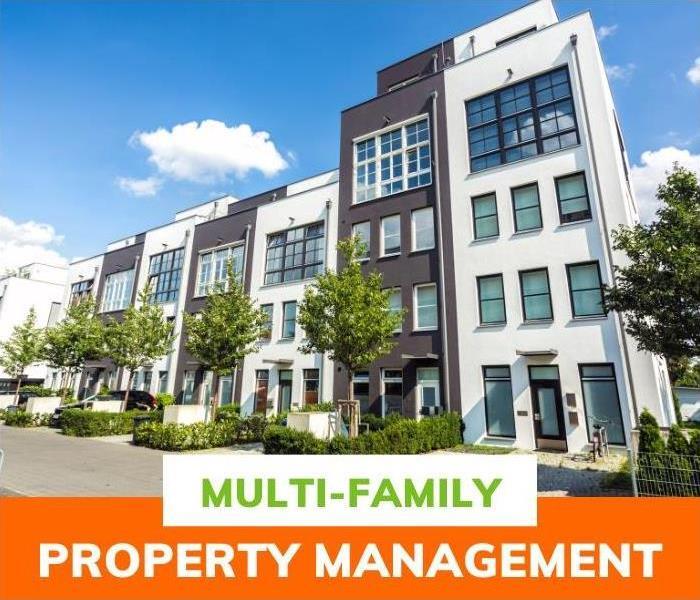Multi-Unit Property Management Best Practices
2/6/2024 (Permalink)
Managing a multi-unit property is a big job but can also come with big rewards. According to some salary sites on the web, property managers for multi-family unit properties can earn upwards of $85,000 annually, and this is on top of the satisfaction that comes along with knowing you’re helping others to live richer, fuller lives.
Although multi-family property management best practices are very similar to those used in managing single-occupancy dwellings, some special considerations come along with managing multi-unit properties. If you’re considering moving into management for multi-family properties or are considering upgrading your current property management career to include multi-unit properties, below are some best practices to keep in mind:
Establish Clear Communication From the Outset of Tenant Relationships
The most important thing you can do as a multi-family property manager is establish and support clear communication from the outset of any lease agreement. Maintaining clear communication can help your property management company avoid legal issues and can help avoid conflicts surrounding matters like rent payments. When you support strong communication, you have the opportunity to avoid tenant relationship breakdowns and conflict.
It’s also worth noting that you’ll likely end up working with many different people over the course of your career, all of whom will have their own personalities and styles of communication. To make things run smoothly between all of these different personalities, it’s a good idea to have a written policy on tenant communication in place. This document isn’t meant to govern how tenants communicate with staff, but instead, it should lay out acceptable forms of communication for different concerns.
For example, matters regarding rent or repair disputes should be submitted in writing to establish a paper trail. Conversely, you may decide it’s best to discuss matters involving neighbor disputes in person with a witness present. No matter how you decide to lay out your communication policy, document it and present your requirements to tenants before they sign leases.
Take Care of Maintenance and Repair Requests Quickly
Addressing maintenance and repairs promptly according to the terms of a lease agreement is vital for maintaining trust with your tenants. This is especially true in cases where property damage may affect tenants' quality of life, such as after a fire. You’ll want to seek out fire damage restoration services quickly in a case like this since damage after a fire may pose a health hazard to tenants. Also, by taking care of property maintenance issues quickly, you build trust with tenants and reduce disruptions to your daily workflow.
Maintenance and safety issues may also be matters of the law. Most states have specific laws regarding tenant rights and landlord obligations. If you or your property management company do not uphold a tenant’s rights or fulfill your obligations, the issue may end up in court. Losing a legal battle can result in fines, fees, and damage to your professional reputation. When you stay on top of maintenance and repair requests, you avoid these issues and may even boost your reputation.
Have a Screening Process in Place for Tenants
A comprehensive tenant screening process is vital among other multi-family property management best practices. When you screen tenants for suitability, you reduce the chances of dealing with headaches and conflicts over issues like rent collection, and you’re less likely to experience tenant retention challenges.
Tenant screening is also good for tenants so they don’t end up renting units for which they are not financially suited. Of course, you must follow state and federal housing guidelines when screening tenants, but having measures in place to ensure a thriving community will benefit you and your tenants.
When designing a screening process, set reasonable requirements that factor in the possibility of past mistakes. No one is perfect, and people change. You need to protect the integrity of your property and look out for the safety and well-being of all tenants. Still, you don’t want your screening process to become so stringent that it alienates otherwise viable renters.
Use Tech Tools for Efficiency and Safety
The use of technology like property management software is also among the top multi-family property management best practices for real estate professionals. Successful property management is all about efficiency when dealing with multi-family dwellings. As a property owner or manager, you will likely be dealing with numerous requests from multiple tenants daily, so anything you can do to maximize productivity during your workday is good. The software allows you to keep track of all of your rental properties from one place, and many programs provide access to budgeting tools to monitor cash flow.
Security technology is also a good investment for multi-unit properties. These types of properties are often large and sprawling, meaning there’s lots of ground to cover. Installing security cameras and quality lighting in strategic areas around your entire property can serve as a deterrent to criminals, and it can also be a benefit if a matter needs to be investigated in the future.
Consider installing door access technology that lets tenants come and go by swiping an electronic keycard. This can prevent unauthorized individuals from gaining access to your properties. When integrated with property management software and Internet of Things (IoT) technologies, these elements add an additional layer of security to protect tenants and your properties.
Contact the Experts at SERVPRO Alhambra to Learn More
SERVPRO Arcadia is your partner for successful property management. SERVPRO restoration services are the perfect complement to multi-family property management best practices, and we’re here for you for fire damage repair, mold remediation, storm damage cleanup, and more.





 24/7 Emergency Service
24/7 Emergency Service
